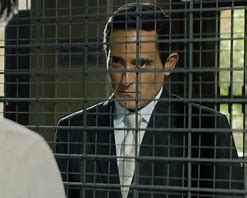Section 375 movie review: Akshaye Khanna, Richa Chadha deliver a brave film that raises questions.
Cast: Akshaye Khanne, Richa Chadha, Rahul Bhat, Meera Chopra
Director: Ajay Bahl
Section 375 movie review: Akshaye Khanna plays a brutal lawyer in the film.
Courtroom drama is Bollywood’s favourite formula that is tried-and-tested. With power-packed punchlines, influential lawyers fighting high-profile cases, and the verdict mostly giving out a strong message, courtroom tales are known to be gripping. And, therefore, it’s no surprise how Section 375, based on Section 375 of Indian Penal Code (IPC), effortlessly manages to register its presence in the minds of people. Directed by Ajay Bahl with actors Akshaye Khanna and Richa Chadha in pivotal roles, it’s surely a brave and relevant film that tackles a rather complex issue — of laws made to protect women, and the very same laws being misused by women for their vested interest. The way narrative switches from one person’s point of view to another’s, presents both sides of the story.
Without unnecessary contrivances, the film’s story is pretty much as shown in its trailer. A movie director, Rohan Khurana (Rahul Bhat) is accused of raping the junior costume design assistant, Anjali Dangle (Meera Kapoor). He is deemed guilty and awarded a sentence of 10-year rigorous imprisonment. He appeals in the High Court and to defend his case, he hires a high-profile lawyer — the best in the business — Tarun Saluja (Akshaye Khanna), who tries to belittle every argument that the prosecution lawyer Hiral Gandhi (Richa Chadha) makes in the court.
Watch the trailer for Section 375:
The film doesn’t feel dragged at any point and sends out the messages it intends to, quite early on. It touches upon its main premise of making the audience aware of what Section 375 is about. As otherwise perceived that ‘no rape happens without a woman’s consent’, the film strongly emphasises on the need to differentiate between ‘will’ and ‘consent’, the two main requisites when it comes to sex.
The courtroom scenes are loaded with data, statistics, facts and figures laid out on a platter for you to digest at one go. However, don’t complain if you miss Sunny Deol’s signature ‘tareekh pe tareekh’ monologue from Damini, or Amitabh Bachchan’s rulebook on women’s safety in Pink or Taapsee Pannu’s speech on secularism in Mulk, because Section 375 has no such over-the-top loud or screaming scenes in the courtroom.
Akshaye Khanna plays a senior defence lawyer in Article 375.


However, there are ample heavy-weight dialogues that form the soul of this film and writer Manish Gupta deserves a special mention for that. Imagine these said in a brooding tone: ‘We’re not in the business of justice, we’re in the business of law’, ‘Law is not justice. It’s a tool to get there’, ‘Never fall in love with the law, it’s a jealous mistress’ and ‘Justice is abstract, law is a fact’. So much gravitas, no!
Then there are the intended puns placed cleverly in the script. For instance the scene in which Akshaye compares ‘daal, chawal, dahi’ to ‘defense, prosecutor and law’, or the scene in which the judge clarifies he doesn’t believe in ‘one-size-fits-all kind of decision’ when it comes to giving verdict in a case.
Among the cast, Akshaye Khanna impresses with his intense and gritty performance in every frame, though he definitely could have worked a bit more on his flat facial expressions that he didn’t let go of throughout the film. Following suit is Richa Chadha who proves yet again why she is one of the finest we have in Bollywood. Her nuanced act as a junior lawyer, evidently overwhelmed, as she fights her career’s first big case against someone who was once her boss, deserves applause. Kishore Kadam and Krutika Desai as judges, Sandhya Mridul and Shriswara as the protective wives are performances that add value to the script.
Richa Chadha defends the accuser in Section 375.

The film gives you a deep insight into what goes on in the minds of those holding the position of power, who think it’s normal to violate a woman’s mind and body with or without her consent. At one point, Rahul Bhat’s character is shown yelling at the female costume assistant because she dared to ‘think’.
Section 375 also shows the corrupt side of our judicial system. Despite the lawyer’s wife warning him that ‘given today’s scenario, it’s not right to defend a rape accused’, and that they have a young daughter, he goes ahead and takes up the case. And in his defense, his 8-year-old watches cartoon network, so chances are unlikely she would spot her father on news channels, being involved in such a case. That’s not it. Familiarising you with our legal system, Section 375 shows how this senior lawyer puts in more research into knowing the personal traits and track record of the judge assigned to his case, than the file of his client.
The film also brings you closer to the harsh reality of our system in which the rape victim is subjected to shamefully explicit questions. Questions such as ‘What was the position while she was being raped, was there proper penetration, did the accused ejaculate’and so on and so forth, would make you cringe.
To conclude, Section 375 is a well-timed film with the MeToo movement still finding its ground. As it rightly states, ‘every false accusation of rape is another nail in the coffin of an actual rape victim’. This film raises important questions and leaves you thinking.
